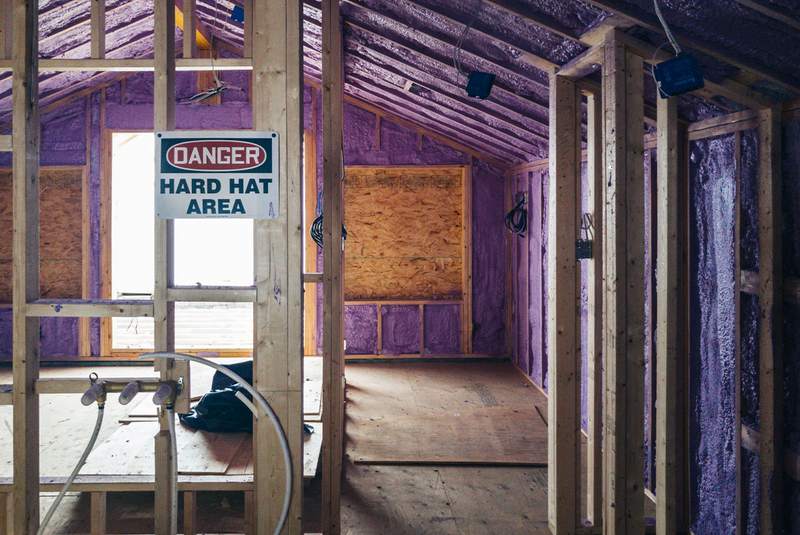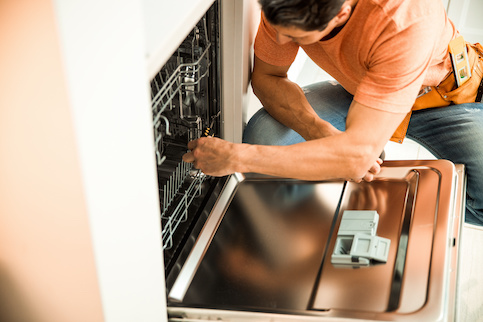People remodel for all kinds of reasons, from making home improvements for comfort to repairs to aging infrastructure or updates for better sustainability. Home repairs and updates usually pay off with a strong return on investment when you are ready to sell, but remodels are usually expensive projects, costing on average up to $79,125, depending on the scope of work.
The words “renovating” and “remodeling” are often used interchangeably, but they are two distinct tasks. Renovating is usually smaller in scope and scale, like redoing a kitchen or a bathroom, as opposed to building one. Remodeling (usually) involves making structural changes to a home and may include taking down walls or building on an old foundation. And hidden costs may crop up, like temporary housing during a major overhaul. Being prepared can help you keep costs under control. Here are seven unexpected and overlooked costs and how to avoid or prepare for them when you remodel your home.
Key Takeaways:
- Unexpected remodeling costs add up quickly. Planning ahead and committing to clear communication with professionals can help minimize surprises.
- Most contractors handle obtaining the permits necessary for remodeling projects.
- A contingency budget is essential (10% to 20% of the total budget may provide some protection) to cover any common structural surprises, like water damage, termites, or foundation issues.
- Don’t forget to include temporary living expenses, like dining out, short-term rentals, and pet boarding.
1. Paying For Permits
Before you break ground on any remodel (and some renovation projects), you’ll need to get permits from your local authorities (county, village, or city). The cost will vary depending on where you live. According to recent data from Angi, the average cost of a building permit could be as little as $150 or as much as $7,500 for a large project with multiple permits needed.
Some examples of home remodel projects that almost always need a permit include:
- Installing new plumbing or electrical wiring
- Changing a roofline
- Adding or removing a load-bearing wall
- Building an addition
- Building a garage or other outbuilding
Contractors usually obtain the permits (often good for up to a year), but homeowners should always do their due diligence to learn about permits and fees, local zoning laws and regulations, and mark their property lines to prevent expensive mistakes. For example, if you are building an addition and it ends up encroaching on your neighbor’s property, you may have to tear down the work and start again or risk a lawsuit.
Every municipality has its own regulations on what types of construction require a permit. You can usually find the information online or in hard-copy form at your local government’s building department.
Ignore permits at your (and your contractor’s) peril. Remodeling without them puts you at risk for high fines and stop-work orders from your municipality, and it could be a liability when you sell in the future. Most municipalities have to sign off on any completed work as well.
What’s Your Goal?
Buy A Home
Discover mortgage options that fit your unique financial needs.

Refinance
Refinance your mortgage to have more money for what matters.
Tap Into Equity
Use your home’s equity and unlock cash to achieve your goals.
2. Installing New Appliances or Systems
Many remodels call for upgrades to plumbing and electrical systems as well as HVAC, especially if you are updating an old home, to comply with current codes.
It’s always a good idea to upgrade, says John Kral, realtor and investor who helps buyers, sellers and investors navigate home renovations in Port Huron, Michigan. “Upgrading mechanicals – like HVAC systems, insulation, windows and water heaters – may not be flashy, but they’ll pay you back every single month in lower energy bills. Plus, it’s way cheaper and easier to upgrade your finishes later than it is to retrofit your home’s bones,” he recommends.
Installing new appliances and systems can run between $4,000 to $7,000 for a kitchen remodel. An upgrade to HVAC (most have a typical lifespan of 15 to 20 years) may run you $6,775 to over $12,000. Plumbing for a new bathroom could cost you upwards of $10,000.
In some cases, a home warranty may cover updates and repairs during remodeling. If the remodel is being done because of damages from a hazard or natural disaster, your home insurance may cover some of the costs.
Ready To Refinance?
Get matched with a lender that can help you reach your financial goals.
3. Temporary Living Expenses
Remodeling a home is messy and disruptive work. Depending on the project, you may incur temporary living expenses that aren’t part of your budget. While it can be stressful (and expensive) to move out of your home, consider how the constant presence of builders and contractors may impact your quality of life.
Typically, temporary living expenses may include dining out or ordering in (during kitchen renovations) for multiple meals a day. Plus, if your home is unlivable due to safety concerns, noise, dust and debris, a hotel stay, or temporary rental could add to the high cost of a project.
How much? According to data from NerdWallet, a 30-day Airbnb rental (median price) could run you up to $169 per night, and a hotel stay could be even more expensive.
Do you have pets? If they can’t stay with you off-site, you may have to pay upwards of $90 a day to board them. In addition, it may be especially stressful for pets and children to be uprooted from their daily routines.
Pro tip: Ask your contractor how long they anticipate that you will need to vacate the home, and add a budget line for potential living expenses, from lodging to food to even entertainment, before you begin your remodel.
View Your Refinancing Options
Find a refinance lender that will work with your unique financial situation.
4. Finding Structural Problems
Another hidden cost of remodeling is addressing structural issues, especially in older homes. These unforeseen problems – like mold, water damage, pests or an unstable foundation – can add significantly to your budget.
Repair costs vary widely, with water damage running anywhere from $2,000 to $6,000 (or more), according to HomeGuides, but your home insurance may cover some water-related issues.
The average cost of termite damage repair ranges from $1,000 to $10,000, and foundation repairs could cost you between $2,176 and $7,833, based on information from Angi.
In addition, uncovering noncompliant wiring and adding support beams will increase the cost.
Plan for a contingency budget of up to 20%, recommends Kral and other rehab experts, for emergencies, and discuss any structural concerns upfront with your contractor before they begin work on your house.
5. Bringing Your Home Up To Code
If you are remodeling an older home, especially if your remodel includes LEED certification or other eco-friendly changes, chances are your contractor will need to bring it up to code so it complies with current building codes.
At one time, building codes were designed to ensure safety in the home, but now they enforce sustainability and emergency efficiency, which in turn benefits homeowners, who may qualify for tax-related residential energy credits and have lower electric bills due to new standards.
Bringing a home up to code may lead to hidden costs during remodeling projects. If a contractor discovers that a home has noncompliant or outdated elements, like lead, homeowners will have to pay to bring them up to code. One common example, according to the Asbestos Institute: The average price to remove asbestos siding is typically between $700 and $1,200.
Another issue in older homes is outdated knob-and-tube wiring for electricity that must be replaced to bring a home up to code. Costs for this type of upgrade depend on the installation but could be upwards of $900 per light switch, which can add up, and this fix in a home is not optional.
“Finding out that your renovation is going to have to pass a code inspection and that prior work was not completed to code can certainly be a source of frustration and unanticipated costs,” warns Ken Sisson, a real estate agent with Coldwell Banker Realty in Studio City, California. “Anything can happen. Some things can be offset by the purchase of a home warranty; some things cannot.”
6. Changing Your Mind
A significant hidden cost in home remodelling often occurs when a homeowner decides to make edits to the remodel while it is in progress. Known as “scope creep,” this occurs when a project grows little by little, explains Kral, until it becomes unmanageable.
“Change orders are the official version of this. They’re written agreements that modify the original contract to include extra work, and they almost always come with extra costs attached,” says Kral. “Good contractors will make sure these are transparent, but even so, change orders can stack up fast, especially if the project starts uncovering more unknowns, like mold, bad plumbing or outdated electrical.”
The key is to plan for change orders before you even start, both financially and emotionally. “If you expect a few bumps, you’ll be a lot less rattled when they happen,” he says. By ignoring this process, you may find yourself over budget and delayed on the project
In addition, you may face extra charges for additional design consultation. Some contractors charge upfront design fees based on the customization of work and the project’s overall complexity.
“Add at least 20% extra to your total project budget upfront. According to the National Association of Home Builders, unexpected costs, especially from scope changes, are one of the top reasons projects go over budget,” says Kral. “Having that margin turns a potentially devastating ‘uh-oh’ into a manageable pivot.”
7. Cleanup
Remodels are messy and the proper disposal of construction debris is crucial for safety and cleanliness. Some contractors charge additional fees for waste removal, particularly for large projects or hazardous materials.
Depending on the scope of your remodel, you may be responsible for renting dumpsters, which cost around $663 (nationwide), but this will vary depending on the size and your location.
Extra expenses around cleanup include repairs to any lawn damage or cleaning dirt and debris from driveways and patios. Ask your contractor upfront about how their team handles and charges for all types of cleanup after a project.
If your remodel includes any additional items that add value, like adding a garage or a swimming pool, note that these additions may increase your homeowners insurance premium, so be sure to update your policy after the project is completed.
If you don’t want to be surprised by an increased insurance premium, ask your insurer how a remodel would affect it.
Creating A Budget That Works For You
There are concrete steps to take in order to avoid unexpected or overlooked costs during a remodel. Draw up a plan and budget, interview several contractors to find the right bid price, get a thorough home inspection ahead of time and draw up an amount to use as a contingency fund.
Some contractors offer an all-inclusive, fixed-price quote to cover everything from labor and materials to waste removal to delivery fees. If you are remodeling a home in a major city, like New York or San Francisco, you will often pay a premium for labor and materials, and having one inclusive price may save you money.
If you can afford it, consider hiring a project manager to oversee the work being done. Remodeling calls for planning, budgeting and strong communication. A project manager can also troubleshoot on-site and handle unexpected issues, as well as research materials and labor costs before you sign a contract.
If you are remodeling and then considering a move, create a flexible timeline that can handle delays and changes in scope, and set aside funds for any projects afterward, like landscaping and staging the home once the remodel is finished.
If you plan to live in your home after the remodel, investing in upgrades can save you money over time, and eco-conscious buyers may appreciate any sustainable design your remodel incorporates.
There are a few ways to pay for a remodel, including paying in cash to avoid interest payments and taking out a HELOC or home equity loan on your property (assuming you have enough equity to qualify). These types of loans usually have lower interest rates and longer repayment terms than using an unsecured personal loan or paying for a remodel using a credit card.
There are specialized home improvement loans available for remodeling and renovation projects that may provide lower interest rates and extended loan terms. Before you commit to one payment plan, talk to a financial advisor and research all of your options carefully to find the best fit for your budget.
The Bottom Line
A remodel is a rewarding way to improve your lifestyle and increase the value of your home, but it is common for remodeling projects to go over budget due to unexpected costs.
Careful planning, setting aside contingency funds and keeping in weekly or even daily communication with your contractor about scope and spending are all ways to combat cost-related surprises.

Ben Shapiro
Ben Shapiro is an award-winning financial analyst with nearly a decade of experience working in corporate finance in big banks, small-to-medium-size businesses, and mortgage finance. His expertise includes strategic application of macroeconomic analysis, financial data analysis, financial forecasting and strategic scenario planning. For the past four years, he has focused on the mortgage industry, applying economics to forecasting and strategic decision-making at Quicken Loans. Ben earned a bachelor’s degree in business with a minor in economics from California State University, Northridge, graduating cum laude and with honors. He also served as an officer in an allied military for five years, responsible for the welfare of 300 soldiers and eight direct reports before age 25.












